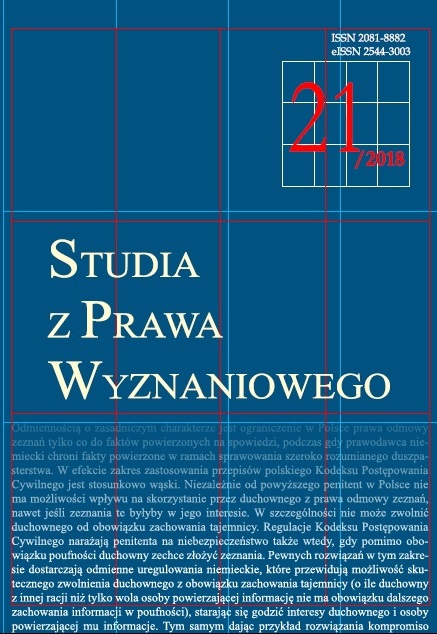Zaświadczenie o braku okoliczności wyłączających zawarcie małżeństwa w procedurze matrimonium per procura
Certificate of no impediments to marriage in the matrimonium per procura procedure
Author(s): Lucjan Świto, Małgorzata TomkiewiczSubject(s): Law, Constitution, Jurisprudence, Civil Law, Theology and Religion, Canon Law / Church Law
Published by: Katolicki Uniwersytet Lubelski Jana Pawła II - Wydział Prawa, Prawa Kanonicznego i Administracji
Keywords: marriage;churches and religious organizations; religious organization; Law on Religion;małżeństwo;przeszkody małżeńskie; związek wyznaniowy; kościoły i związki wyznaniowe;pełnomocnictwo;
Summary/Abstract: This paper presents normative solutions concerning the issuing procedure, the content and the significance of the certificate of no impediments to marriage in the context of regulations related to marriage by proxy (matrimonium per procura). The principal aim and the research problem posed in the article pertain to the question of the specific circumstances this document concerns. Do the control mechanisms accompanying the issuing of this certificate cover the requirements specified in Art. 6.1 of the Family and Guardianship Code, and do they recognize the specificity of marriage contracted by proxy? What is the actual meaning of the phrase used in Art. 8.1 of the Family and Guardianship Code, stating that a priest “cannot accept the declarations referred to in Art. 2.1 [of the Family and Guardianship Code]” without having been presented with the said certificate, and does the prohibition set forth in this regulation prove that the certificate of no impediments to marriage is the essential factor?The paper puts forward the hypothesis that while the idea itself is undoubtedly justified, the adjustment of the regulations of the Family and Guardianship Code and the Registry Office Records Act to ensure compliance with the Concordat has gone too far in the matter under discussion. It has resulted in the introduction of restrictions establishing a clear primacy of formalism over the favor matrimonii principle and has given rise to different assessments of the nature of the said certificate, including opinions claiming the constitutive nature of this document. For persons intending to enter into marriage in the religious form with civil effects, the requirement to present a legally valid certificate has become a condition basically parallel to other, constitutive conditions to marriage, while this restriction is not of general nature. It does not apply to couples intending to contract marriage before the head of a registry office or a consul (Art. 1.1 and Art. 1.4 of the Family and Guardianship Code), and refers only to those who intend to enter into marriage in the religious form with civil effects. The existing state of affairs can hardly be regarded as appropriate. Another deficiency of the current regulations also arises from the fact that the certificate of no impediments to marriage, although it has gained disproportionate importance, does not “recognize” the specificity of religious marriages with civil effects contracted per procura, and in this case does not duly fulfil its guaranteeing functions.
Journal: Studia z Prawa Wyznaniowego
- Issue Year: 2018
- Issue No: 21
- Page Range: 323-343
- Page Count: 21
- Language: Polish

